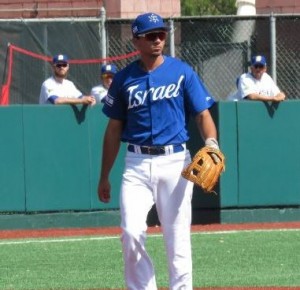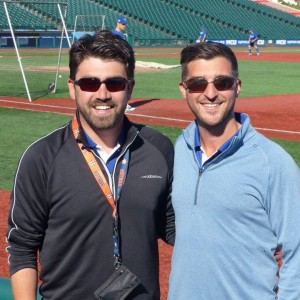How they built Team Israel’s roster
By Sam Brief, Correspondent
In September’s qualifying round for the 2017 World Baseball Classic (WBC), Colorado Rockies prospect Scotty Burcham tallied a .455 batting average, the best on Team Israel and among the top 15 for all teams.
If not for Facebook, Burcham might never have swung a bat in Brooklyn.
Since anyone who is Jewish or has a Jewish parent, grandparent or spouse can play for Team Israel, volunteers like Alex Jacobs, a Houston Astros scout, were asked to help find such players. Jacobs often employed creative methods.

Jewish baseball fans didn’t know Colorado Rockies prospect Scotty Burcham was Jewish until a volunteer scout for Team Israel ‘discovered’ him
“It’s Facebook stalking,” said Jacobs, who recently was named Team Israel’s director of player personnel. “I researched Scotty Burcham, and I found his Facebook. When I research these kids, I look for their parents, and I see if their parents have any Jewish in them. His mother was from New York, I believe. So I checked one box. Then, I looked at a picture of her and thought she looked kind of Jewish.
“So I called [Team Israel manager] Jerry Weinstein and said, ‘How about Scotty Burcham?’ And he said ‘Scotty Burcham? What do you have on him?’ And I’m like, ‘He plays shortstop. He’s Jewish. His mom looks like she’s Jewish.’ So Jerry called Scotty’s manager, and the manager asked Scotty if he was Jewish, and Scotty said, ‘Yeah, I am. Why do you ask?’ And the rest is history. He played really well for us.”
Burcham filled a gaping roster hole in the middle infield and helped Team Israel win the WBC qualifiers for the first time. Israel took down Great Britain and Brazil and then crushed Great Britain, 9-1, in the championship game, to advance to the March 2017 WBC games in Seoul, South Korea.

Houston Astros scout Alex Jacobs (left) and Los Angeles Dodgers scout Jonah Rosenthal (right) volunteered to help Team Israel build its roster for the World Baseball Classic
Israel’s 28-man roster in Brooklyn included former Major League Baseball players such as Ike Davis, Jason Marquis and Josh Satin, who skipped the final game to fly to California for the birth of his child. But Israel’s Law of Return made the roster-building process unlike any other, as the team would venture outside of the database of ballplayers already identified as Jewish.
The WBC’s rules state that a player can join a country’s team if he is eligible for citizenship within that country. Per Israel’s Law of Return, citizenship can be granted to anyone who has a Jewish parent, grandparent or spouse.
“We’re looking for ballplayers who can meet the Law of Return for the land of Israel and become Israeli citizens,” said Peter Kurz, the president of the Israeli Association of Baseball. “That’s a much wider interpretation than the actual Jewish law, which says that you have to have a Jewish mother in order to be considered as a Jew. We were able to make it a little broader.”
Kurz added that Paul Goldschmidt of the Arizona Diamondbacks, whose father is Jewish, doesn’t qualify since he is devoutly Christian.
“We don’t want people who don’t feel Jewish heritage,” Kurz said.
Volunteers like Houston’s Jacobs, Jonah Rosenthal of the Los Angeles Dodgers, Guy Stevens of the Kansas City Royals, and baseball veterans Adam Gladstone and Ty Eriksen uncovered some previously-unknown gems, such as Burcham. But MLB’s rules require proof of eligibility. That was Kurz’s job. Jacobs, Rosenthal and the others gave Kurz the names, Kurz reached out to the players and proved a Jewish connection, and Weinstein managed the team.
“I would get the emails or numbers of their parents, and in almost every case, the parents were totally thrilled that their sons would compete for Team Israel,” Kurz said. “They would send in their son’s Bar Mitzvah certificate, or a birth certificate or a bris certificate. In some cases, I would need a birth certificate of the father. And in other cases, I would have to go to a grandparent.”
It wasn’t always so straightforward. For one player, a tombstone with a Jewish star had to serve as proof.
“The father went to take a picture of his mother’s tombstone, and sent it to me,” Kurz said. “That was the most extreme.”
In between identifying Jewish players and providing proof of their eligibility to MLB officials, Team Israel had to secure each player’s commitment to play. Some former MLBers, like Davis and Marquis, were tougher gets.
“I called both those guys twenty-something times before I got a return call,” Weinstein said. “Marquis had basically retired in the middle of 2015, when he was playing with the Reds. But he pitched on an alumni team in the [National Baseball Congress] World Series in Wichita, and scouts told me he pitched pretty well. So that sparked my interest in him. … He said, ‘I’m gonna check with my wife,’ then he said, ‘I’ll do it.’ He was a great teammate, and a great pitcher on the team.
“Ike Davis got his release from the Yankees, so he was hanging loose, and the timing was just right.”
Team Israel began with a list of known Jewish players maintained by Jewish Baseball News and Jewish Sports Review. Because certain positions were underrepresented, particularly in the middle infield, Weinstein asked his volunteer scouts to find unknowns.
“A lot of what we did was scouring through systems, like college rosters, to find more,” said Rosenthal, the Dodgers scout. “It was an all-hands-on-deck approach. Some of these guys we hadn’t seen. But we weren’t dealing with the biggest demographic out there. Sometimes it involved calling scouts. Sometimes it involved digging for information.” Roughly half a dozen previously-unknown players were discovered as a result of these efforts.
In March, Team Israel will head to Seoul to face off against Chinese Taipei, South Korea and the Netherlands in Pool A of the WBC, where a total of 16 teams will compete for the title of world’s best.
Unlike the qualifiers, which took place during MLB’s regular season, the WBC will take place during the offseason. Kurz and Weinstein hope to add several Major Leaguers to Israel’s roster, including Joc Pederson (who played for Israel in the 2013 WBC qualifiers), Scott Feldman, Alex Bregman, Ian Kinsler, Ryan Braun, Sam Fuld, and more. Weinstein said Kansas City Royals 3B Mike Moustakas, who is married to a Jewish woman, would be eligible if not for a recent stint on the disabled list.
However the roster pans out, volunteers like Gladstone, Jacobs and Rosenthal hope Israel’s success on the international stage will boosts its popularity within the country, which has been a consistent goal. In early January, players will head to Israel for a team trip.
“When we got that final out in Brooklyn, to know the positives that it would do for growing the game in Israel is amazing,” Gladstone said. “It’s not only the money, but also the equipment and notoriety. You felt like you accomplished something. You had a very small part in growing the game of baseball, and for providing opportunities for young kids in Israel who maybe wouldn’t have that if we didn’t win a baseball game.”
# # #
 Sam Brief is a sophomore at Northwestern University’s Medill School of Journalism, where he is a television reporter, radio producer, play-by-play man and writer. Follow him on Twitter @sambrief and feel free to shoot him an email at briefsam@gmail.com.
Sam Brief is a sophomore at Northwestern University’s Medill School of Journalism, where he is a television reporter, radio producer, play-by-play man and writer. Follow him on Twitter @sambrief and feel free to shoot him an email at briefsam@gmail.com.








